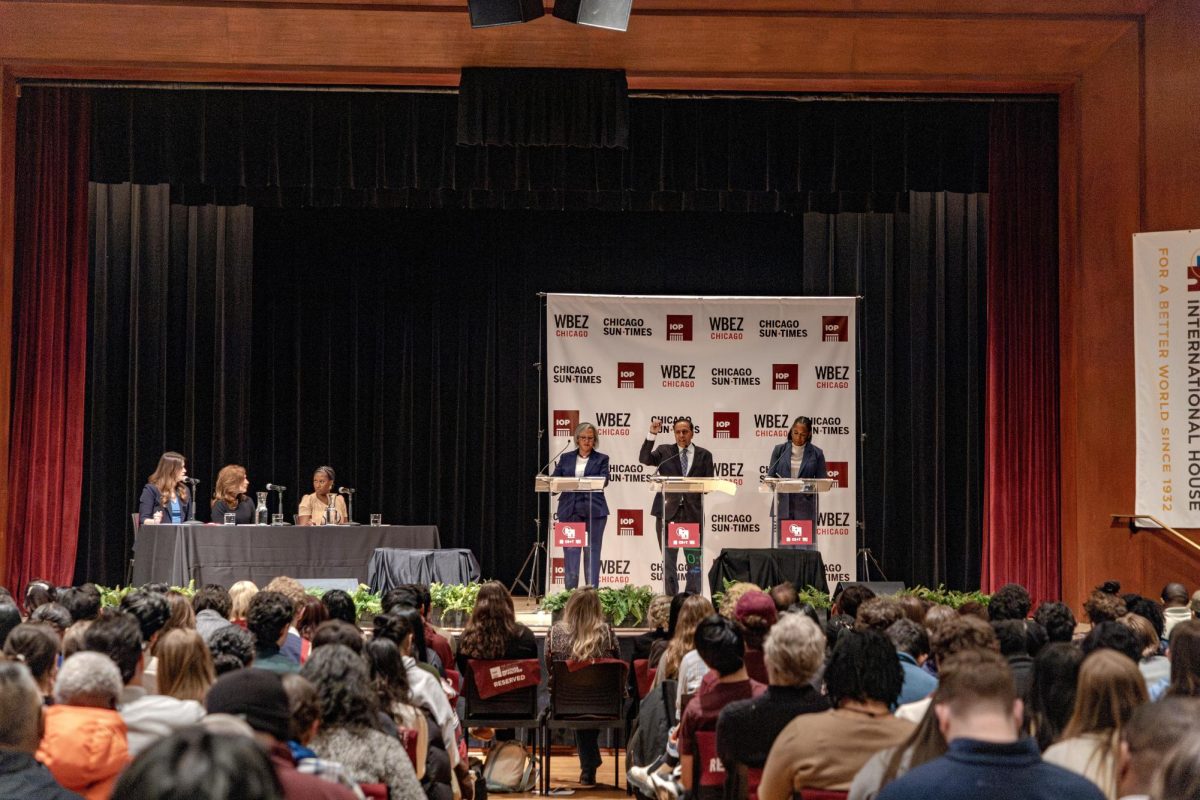Kenzi Bustamante began the summer of 2024 as president of the Chicago Thinker. The Thinker, the University of Chicago’s conservative newspaper, was—for its supporters—a remarkable success story. It had built a strong Twitter base, with nearly 35,000 followers. Its writers had been launched onto Fox News and Real America’s Voice. According to internal documents obtained by the Maroon, it had around $62,000 in grant money and private donations ready to carry it into the fall. And it had achieved all this while denouncing the campus “mob” that, in 2020, it had been founded to resist.
But Bustamante (A.B. ’24) would not end the summer with her role as president. In fact, both of the Thinker’s lead editors—Bustamante and Publisher Ben Ogilvie (J.D., M.B.A ’25)—would be expelled by the Thinker’s founding editors in what Ogilvie, a law student, described as a “coup of the Thinker.”
The struggle for control over the Thinker plays out across dozens of internal emails and documents obtained by the Maroon this fall. Conflict over “juvenile” editorial decisions and the status of the Thinker’s affiliated nonprofit, the Chicago Thinker Foundation, spiraled into a bitter struggle that left the masthead bare and the website dark for months.
Trouble began in late June, when Bustamante and Ogilvie turned their attention away from the paper’s daily operations and toward one of its longstanding goals: financial independence from the Intercollegiate Studies Institute (ISI), a conservative think tank that funds independent student publications across American universities.
The Thinker had begun to secure independence two years before. In the spring of 2022, the Thinker’s founding editors, Evita Duffy-Alfonso (A.B. ’22) and Audrey Unverferth (A.B. ’22), had set up a nonprofit corporation—the Chicago Thinker Foundation, a 501(c)(3)—which could shelter the Thinker’s money if the decision was ever made to separate from the ISI. Duffy-Alfonso, Unverferth, and Declan Hurley (A.B. ’24), their successor as editor-in-chief, were all named to the Foundation’s board of directors.
In late June 2024, Hurley wrote to Duffy-Alfonso and Unverferth asking them to name the Thinker’s new editorial leadership to the board of the Foundation.
“Kenzi and I want the Thinker to financially separate from the Collegiate Network,” the ISI’s network of campus publications, Hurley wrote. But this would be nearly impossible if the Thinker’s day-to-day leadership did not have control over the Foundation designed to shelter the paper’s money.
“It would make much more sense for the people running the Thinker to have legal oversight over the publication,” Hurley wrote.
A week later, Unverferth responded. It was clear that a transition would not be forthcoming.
Since becoming publisher, Ogilvie had made several changes to the website that Unverferth found tasteless, she wrote.
“The Chicago Thinker is not ‘right-leaning,’ nor is it some mere ‘free speech experiment’ sharing ‘spicy’ (juvenile!) ‘hot takes,’” Unverferth wrote, quoting Ogilvie’s changes. “The Thinker is conservative and libertarian or it is not the Thinker.”
Unverferth further accused the Thinker’s leadership of mismanaging their finances, leaving an invoice from their legal counsel’s office unpaid. Unverferth wrote that she could not “in good conscience” name Ogilvie to the board of the Thinker Foundation. She also declined to extend a board invitation to Bustamante.
In a string of emails, Bustamante assured Unverferth that she would undo Ogilvie’s website changes but asked that she still be appointed to the board of the Thinker Foundation. Unverferth ignored this appeal while requesting further minor changes to the website, a complete inventory of the Thinker’s finances, and the immediate payment of all outstanding legal bills.
According to expense sheets Bustamante provided to the Maroon, these legal bills only listed charges associated with the Thinker Foundation, like filing tax forms and drafting bylaws. Since the Foundation had been set up by Unverferth and Duffy-Alfonso, it had accrued over $5,000 in legal fees, with the Foundation’s lawyer billing at over $500 per hour, emails show.
At the end of July, Bustamante, still refused a seat on the Thinker Foundation’s board, told Unverferth that she would not be using the funds of the Thinker publication, provided by the ISI, to pay the Thinker Foundation’s 2024 501(c)(3) annual registration fees.
“I do not see the legal connection between the two entities, or the benefit of spending Chicago Thinker funds on Chicago Thinker Foundation fees,” Bustamante wrote.
Bustamante told the Maroon that, during this period, the Foundation had failed to fulfill its original purpose of securing the Thinker’s financial independence from the ISI.
Within three days of informing Unverferth and Duffy-Alfonso that she would not be paying the Foundation’s filing fees, Bustamante found that the passwords to the Thinker’s website, Gmail, and social media accounts had all been changed. She no longer had access.
“Everything has been changed to Audrey’s phone number and email. I was hoping you all could let me know what’s going on,” Bustamante wrote to Unverferth, Hurley, and Duffy-Alfonso.
The changes caught Hurley by surprise as well. He wrote urgently to Unverferth and Duffy-Alfonso: “To put matters lightly, I am concerned that Kenzi does not have access to the Thinker accounts.… Can you please confirm that you had no role in signing Kenzi out?”
But Unverferth and Duffy-Alfonso had indeed played a role in signing Bustamante out, Ogilvie told the Maroon.
“They used their control of the login credentials to take control of the Thinker from Kenzi, me, and Declan,” Ogilvie said.
On August 18, after nearly three weeks of silence, Bustamante and Ogilvie received nearly identical emails informing them that they had been fired from the Thinker.
“We no longer believe that the Chicago Thinker is a good fit for you,” Unverferth and Duffy-Alfonso wrote Ogilvie. “The Board of the Chicago Thinker Foundation has decided to remove you as acting Managing Editor of the Chicago Thinker newspaper, effective immediately.”

Bustamante and Ogilvie refused to accept that the Foundation had any authority to fire them. Bustamante told the Maroon that the Thinker Foundation’s articles of incorporation did not authorize the board of directors to dismiss the publication’s staff.
“They never answered the question of how they have authority over the paper, because they don’t have authority,” Bustamante told the Maroon.
In a statement to the Maroon, Duffy-Alfonso and Unverferth wrote that the “Chicago Thinker Foundation is a Section 501(c)(3) nonprofit media organization that owns the Chicago Thinker student publication and funds and oversees its operations.”
“The Foundation, through its publication, provides UChicago student volunteers with extraordinary opportunities for leadership and public commentary. As with any organizations made up of volunteers, at times, volunteers may be dismissed when deemed appropriate,” Unverferth and Duffy-Alfonso wrote.
Bustamante maintains that the Thinker Foundation and the Thinker publication were and remain legally separate entities.
Although she had been dismissed by Unverferth and Duffy-Alfonso, Bustamante filed a claim with SiteGround, the host of the Thinker’s website, requesting control over the domain. She also contacted the ISI and requested their help restoring the Thinker’s digital accounts to its student editors.
Two weeks later, Bustamante received a cease-and-desist letter from the same law firm whose legal fees she had refused to pay.
“[W]e ask that you please immediately refrain from making further representations that you have any authority to make decisions for [the] Foundation and the Chicago Thinker,” the letter read. It instructed Bustamante to “take appropriate corrective measures as directed by the Foundation Board.”

Bustamante would not have time to contest the letter. Just weeks before the start of autumn quarter, Bustamante decided to take a corporate job rather than return to the University to complete the final year of her four-plus-one master’s program.
Bustamante told the Maroon that the controversy at the Thinker played no role in her decision to leave the University.
Bustamante’s decision not to return to campus left Ogilvie alone to contest control over the Thinker. In the days before the start of the academic year, Ogilvie wrote to the Thinker staff that, assured of the support of the ISI, he would be reestablishing the Thinker with an entirely new digital presence.
“I like the Thinker brand, and I am not eager to leave it behind,” Ogilvie wrote. “This means that the Thinker will continue on campus next year, which is what I care about most: I want to continue mentoring students and producing good writing.”
Just hours later, a post on the Thinker’s X account—controlled by Unverferth and Duffy-Alfonso—announced that fourth-year Christopher Phillips had been appointed the publication’s editor-in-chief. Rather than further contest control of the paper, Ogilvie decided to hand over the reins to Phillips.
In a final email to the Thinker’s alumni, Ogilvie denounced Unverferth and Duffy-Alfonso for taking control of the publication.
“Audrey and Evita have barely been involved with the Thinker since they graduated,” Ogilvie wrote. “I do not recommend doing favors for the Thinker, participating in Thinker events, or recommending current UChicago students write for the paper.”
In short, Unverferth, Duffy-Alfonso, and Phillips had carried out a “coup of the Thinker,” Ogilvie told the Maroon.
“I don’t say that they carried out a coup to give them a hard time,” he said. “A coup is basically a power takeover by insiders, and that’s basically what happened here.”
“It’s just something people who are managing an organization should be aware of,” Ogilvie added.
Phillips did not reply to the Maroon’s request for comment.
In a conversation with the Maroon, Bustamante said she was unsure who now controls the Thinker’s website and funds.
Since July, no new articles have appeared on the website. When Ogilvie decided to hand the publication over to Phillips, he was able to update the masthead to reflect his departure, he said.
Ogilvie believes Unverferth, Alfonso-Duffy, and Phillips now have editorial control over the website.
Neither Ogilvie nor Bustamante knew whether the ISI had agreed to hand the outstanding funds over to the Thinker’s new leadership. Ogilvie believes they have.
The ISI did not respond to the Maroon’s request for comment.
Ogilvie and Bustamante both maintain that Unverferth and Duffy-Alfonso had no authority to dismiss them from their editorial roles.
Unverferth and Duffy-Alfonso see things differently.
“The Foundation supports and protects the student publication by providing financial oversight, safeguarding the paper’s intellectual property, and defending its mission[,]” they wrote in their statement. “The Foundation operates the Thinker so that strong conservative and libertarian voices may flourish on UChicago’s campus for generations to come.”
Correction, November 10, 2024, 6 p.m.: This article was corrected to reflect that the most recent article posted on the Thinker’s website was posted in July, not in June as was previously stated.
















Julie Grenn / Nov 3, 2024 at 5:10 pm
Wow, those two are crazy. Wildly power hungry and unable to move on from college
MP (AB ‘24) / Nov 1, 2024 at 9:11 am
It’s a great scoop but the article definitely missing some fleshing out on how the new people in charge of the thinker are A LOT more extreme than the run-of-the-mill conservatives they’re replacing (Kenzi, Declan). Takeaway is that Audrey and Evita are controlling, and have used their money/connections and roles as the OG board members to rid the pub of anyone not deemed sufficiently ideologically committed.
Seamus Heaney / Oct 31, 2024 at 3:49 pm
Just a bunch of grifters fighting over a shrinking pie. Good riddance.